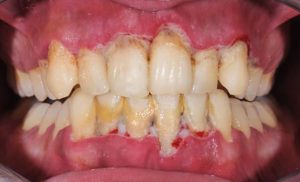 Cavities aren’t the only culprit of tooth loss. Gum disease is also a leading cause. According to the Centers for Disease Control and Prevention, 50% of adults over the age of 30 have a form of the preventable infection. Although gum disease can affect anyone, no matter age, older adults are at a higher risk. Many factors can increase your risk of gum disease. Here are the tips you need to keep your gums healthy.
Cavities aren’t the only culprit of tooth loss. Gum disease is also a leading cause. According to the Centers for Disease Control and Prevention, 50% of adults over the age of 30 have a form of the preventable infection. Although gum disease can affect anyone, no matter age, older adults are at a higher risk. Many factors can increase your risk of gum disease. Here are the tips you need to keep your gums healthy.
Causes of Gum Disease in Older Adults
68% of adults over the age of 65 have gum disease. The infection is caused by bacteria found in plaque and tartar from poor oral hygiene. Seniors can be more vulnerable to bacteria for many reasons, including:
- Medications: Some medications used to treat age-related conditions can increase your risk of oral infections, like those used for cardiovascular issues.
- Hormonal Changes: Menopause causes hormonal imbalances that can lead to desquamative gingivitis, a painful form of gum disease.
- Diseases: Systemic health conditions can increase your risk of infections and healing delays, like heart disease and diabetes.
- Poor Nutrition: Vitamin C deficiency can manifest as bleeding, swollen gums.
- Physical and Mental Wellness: Physical mobility can decrease with age, which can make it difficult to maintain good oral hygiene at home. Mental decline from Alzheimer’s and other conditions can also contribute to poor dental health.
Gum Disease Affects Overall Health
Gingivitis is the earliest stage of gum disease, which is easy to treat. However, with no treatment, bleeding, tender, and swollen gums from the infection can progress to tooth loss. Not only can gum disease wreak havoc on your smile, but it is also linked to several health concerns, like heart disease, diabetic complications, respiratory illness, and Alzheimer’s. Healthy gums support your overall wellness.
Preventing Gum Disease
You can protect your mouth from gum disease by following a few simple tips:
- Brush and Floss: Brush your teeth at least twice daily for 2 minutes using a fluoride toothpaste and soft-bristled toothbrush. Floss your teeth at least once daily. If traditional floss is too difficult to use, a waterflosser is a comfortable, effective solution to clean areas your toothbrush can’t reach.
- Don’t Smoke or Drink Alcohol: Tobacco and alcohol affect your immune system, which can increase your risk of infections and delayed healing.
- Stay Hydrated: Age and medications can cause a dry mouth, which is a great environment for oral bacteria growth. Drink plenty of water to stay hydrated.
- Visit Your Dentist Regularly: Schedule a cleaning and checkup with your dentist every 6 months. They can spot the early signs of gum disease to stop the infection in its tracks.
If you have symptoms of gum disease, don’t wait. Contact your dentist if you have red, swollen, or bleeding gums.
About Dr. Naveen Karim
Dr. Karim earned her dental degree at Baylor College of Dentistry and continued her education in periodontics. She is dedicated to helping every patient maintain a healthy smile. Don’t ignore the early signs of gum disease. Request an appointment through her website or call her office at (940) 242-2401.
